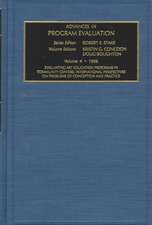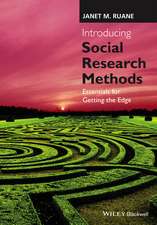Multiple Case Study Analysis
Autor Robert E. Stakeen Limba Engleză Paperback – 24 noi 2005
Examining situational complexity is a vital part of social and behavioral science research. This engaging text provides an effective process for studying multiple cases--such as sets of teachers, staff development sessions, or clinics operating in different locations--within one complex program. The process also can be used to investigate broadly occurring phenomena without programmatic links, such as leadership or sibling rivalry. Readers learn to design, analyze, and report studies that balance common issues across the group of cases with the unique features and context of each case. Three actual case reports from a transnational early childhood program illustrate the author's approach, and helpful reproducible worksheets facilitate multicase recording and analysis.
Preț: 394.64 lei
Nou
Puncte Express: 592
Preț estimativ în valută:
75.51€ • 78.84$ • 62.50£
75.51€ • 78.84$ • 62.50£
Carte disponibilă
Livrare economică 14-28 martie
Livrare express 27 februarie-05 martie pentru 33.89 lei
Preluare comenzi: 021 569.72.76
Specificații
ISBN-13: 9781593852481
ISBN-10: 1593852487
Pagini: 342
Ilustrații: Illustrations
Dimensiuni: 152 x 229 x 23 mm
Greutate: 0.49 kg
Ediția:1
Editura: Guilford Publications
Colecția Guilford Press
ISBN-10: 1593852487
Pagini: 342
Ilustrații: Illustrations
Dimensiuni: 152 x 229 x 23 mm
Greutate: 0.49 kg
Ediția:1
Editura: Guilford Publications
Colecția Guilford Press
Public țintă
Professional Practice & DevelopmentCuprins
1. Single Cases
1.1. Situation and Experience
1.2. A Technical View of a Case
1.3. The Quintain
1.4. The Case-Quintain Dilemma
1.5. The Research Questions
1.6. The Particular and the General
1.7. The Contexts
1.8. Making the Individual Case Report
2. The Multicase Study
2.1. Staffing
2.2. Selecting Cases
2.3. Activity in Its Situation
2.4. Data Gathering across Cases
2.5. Triangulation within Cases
3. Cross-Case Analysis
3.1. Rationale
3.2. Reading the Collection
3.3. Cross-Case Procedure
3.4. Expected Utility of Cases and Ordinariness of Situations
3.5. The Grounds for Assertions
3.6. Cross-Case Assertions
3.7. Triangulation across Cases
4. The Report
4.1. Planning the Multicase Report
4.2. Comparing Cases
4.3. Advocacy
4.4. Generalization
5. The Step by Step Case Study Project
5.1. The Open Society Institute and the International Step by Step Association
5.2. The Step by Step Approach
5.3. Previous Step by Step evaluations
5.4. Aims of the Step by Step Multicase Project
5.5. Developing Case Topics
5.6. Action Research
5.7. Themes for Cross-Case Analysis
5.8. The Teams and the Steering Group
5.9. Training the Case Researchers
Three Step by Step Case Studies
6. The Ukraine Case Study
7. The Slovakia Case Study
8. The Romania Case Study
9. Step by Step Cross-Case Analysis: First Steps
1.1. Situation and Experience
1.2. A Technical View of a Case
1.3. The Quintain
1.4. The Case-Quintain Dilemma
1.5. The Research Questions
1.6. The Particular and the General
1.7. The Contexts
1.8. Making the Individual Case Report
2. The Multicase Study
2.1. Staffing
2.2. Selecting Cases
2.3. Activity in Its Situation
2.4. Data Gathering across Cases
2.5. Triangulation within Cases
3. Cross-Case Analysis
3.1. Rationale
3.2. Reading the Collection
3.3. Cross-Case Procedure
3.4. Expected Utility of Cases and Ordinariness of Situations
3.5. The Grounds for Assertions
3.6. Cross-Case Assertions
3.7. Triangulation across Cases
4. The Report
4.1. Planning the Multicase Report
4.2. Comparing Cases
4.3. Advocacy
4.4. Generalization
5. The Step by Step Case Study Project
5.1. The Open Society Institute and the International Step by Step Association
5.2. The Step by Step Approach
5.3. Previous Step by Step evaluations
5.4. Aims of the Step by Step Multicase Project
5.5. Developing Case Topics
5.6. Action Research
5.7. Themes for Cross-Case Analysis
5.8. The Teams and the Steering Group
5.9. Training the Case Researchers
Three Step by Step Case Studies
6. The Ukraine Case Study
7. The Slovakia Case Study
8. The Romania Case Study
9. Step by Step Cross-Case Analysis: First Steps
Notă biografică
Robert E. Stake is Director of the Center for Instructional Research and Curriculum Evaluation at the University of Illinois at Urbana-Champaign. He is one of several educational researchers who created theory and practice for educational program evaluation in the 1960s. His responsive evaluation approach emphasizes the study of classroom experience, personal interaction, and institutional processes and contexts, often in the form of case studies. Among the evaluative studies he has directed are studies in science and arts education; model programs; and conventional teaching, including higher education, special education and, with Bernadine Evans Stake, gender equity. He is a recipient of the Special Career Award in Qualitative Inquiry from the International Congress for Qualitative Inquiry, the Lazarsfeld Award from the American Evaluation Association, and the Presidential Citation from the American Educational Research Association, and holds honorary doctorates from the University of Uppsala, Sweden, and the University of Valladolid, Spain. For many years, Dr. Stake has been a prominent voice in a transatlantic invisible college of like-minded evaluators questioning contexts and conventions for educational evaluation and infusing evaluation with fairness and a valuing of experience.
Recenzii
Researchers in education and social science have worried for decades over how to study multiple cases of the same phenomena and come up with viable conclusions. Robert Stake's careful analysis lays out the problems, the pitfalls, and the dangers of such an enterprise, and provides masterful, amply illustrated, easily understood, and reproducible solutions. All of us who study multiple sites will be grateful for this enormous gift, which analyzes and teaches simultaneously.--Howard S. Becker, PhD, author of Writing for Social Scientists and Tricks of the Trade
“Stake does it again: takes up a murky research problem, such as how to integrate multiple case studies that do or don’t have a common subject, and shows us how to solve it. This book could be the basis for a superb graduate seminar or simply the 'manual' for a research team facing a dozen piles of results from case studies. It would also be excellent supplementary reading for a course in qualitative research methods that would provide students with an appreciation of the difficulties and possibilities of drawing conclusions from words.”--Les McLean, PhD, Ontario Institute for Studies in Education (Emeritus), University of Toronto, Canada
This book fills a major gap in the qualitative research and evaluation literature. Although multicase studies are a commonly used strategy, I know of no published work that provides a comprehensive, in-depth, and practical guide to the conduct of such studies. The book embodies the author’s extensive experience and deep understanding of this approach, and manages to be both groundbreaking and user-friendly. The detailed examples of case studies are a major strength of the book. This book would be appropriate as a textbook for advanced courses in qualitative or case study research, and also as a guide and resource for practicing researchers and evaluators.--Joseph A. Maxwell, PhD, Graduate School of Education, George Mason University
Stake offers a very detailed, honest, and perceptive account of the methodology of cross-case analysis, and the dilemmas of generating both the 'case' and the 'generalization.'--Research Professor Ian Stronach, Manchester Metropolitan University, Manchester, UK
Stake's book provides the reader with hands-on experience in doing multicase research, offering theoretical insights, useful worksheets, and technical detail. The international Step by Step Early Childhood program implemented in Central and Eastern Europe and Central Asia is an ideal study area, with rich contextual data furnishing glimpses of the complexities of changing the patterns and ingrained practices of educational systems.--Henriette Heimgaertner, Bernard van Leer Foundation, The Hague, The Netherlands
-“Stake does it again: takes up a murky research problem, such as how to integrate multiple case studies that do or don’t have a common subject, and shows us how to solve it. This book could be the basis for a superb graduate seminar or simply the 'manual' for a research team facing a dozen piles of results from case studies. It would also be excellent supplementary reading for a course in qualitative research methods that would provide students with an appreciation of the difficulties and possibilities of drawing conclusions from words.”--Les McLean, PhD, Ontario Institute for Studies in Education (Emeritus), University of Toronto, Canada
This book fills a major gap in the qualitative research and evaluation literature. Although multicase studies are a commonly used strategy, I know of no published work that provides a comprehensive, in-depth, and practical guide to the conduct of such studies. The book embodies the author’s extensive experience and deep understanding of this approach, and manages to be both groundbreaking and user-friendly. The detailed examples of case studies are a major strength of the book. This book would be appropriate as a textbook for advanced courses in qualitative or case study research, and also as a guide and resource for practicing researchers and evaluators.--Joseph A. Maxwell, PhD, Graduate School of Education, George Mason University
Stake offers a very detailed, honest, and perceptive account of the methodology of cross-case analysis, and the dilemmas of generating both the 'case' and the 'generalization.'--Research Professor Ian Stronach, Manchester Metropolitan University, Manchester, UK
Stake's book provides the reader with hands-on experience in doing multicase research, offering theoretical insights, useful worksheets, and technical detail. The international Step by Step Early Childhood program implemented in Central and Eastern Europe and Central Asia is an ideal study area, with rich contextual data furnishing glimpses of the complexities of changing the patterns and ingrained practices of educational systems.--Henriette Heimgaertner, Bernard van Leer Foundation, The Hague, The Netherlands
Descriere
Examining situational complexity is a vital part of social and behavioral science research. This engaging text provides an effective process for studying multiple cases--such as sets of teachers, staff development sessions, or clinics operating in different locations--within one complex program. The process also can be used to investigate broadly occurring phenomena without programmatic links, such as leadership or sibling rivalry. Readers learn to design, analyze, and report studies that balance common issues across the group of cases with the unique features and context of each case. Three actual case reports from a transnational early childhood program illustrate the author's approach, and helpful reproducible worksheets facilitate multicase recording and analysis.














